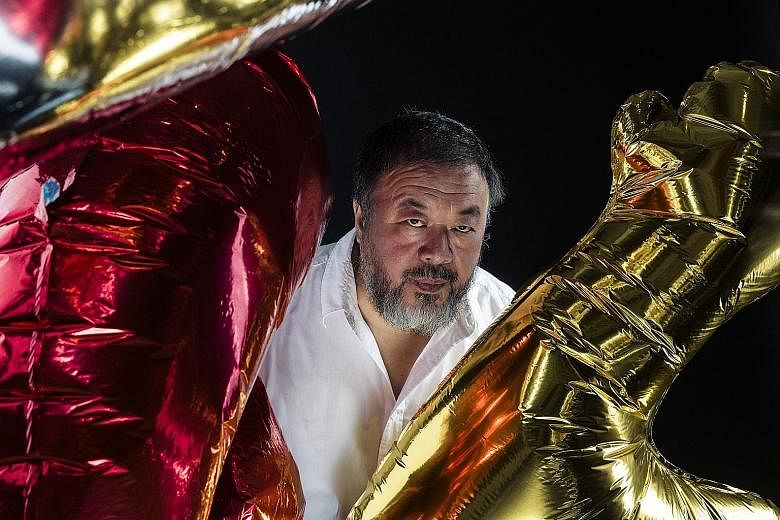BEIJING • For Ai Weiwei, the outspoken Chinese artist, the idea was irresistible.
He had become obsessed with a red scribble that appeared on a planning document for an art show next month in Yinchuan, a city in north-west China.
He decided to build a large sculpture modelled on the line that he would call Redline - a playful rumination on the idea of censorship.
But last week, the artistic director of the Yinchuan Museum of Contemporary Art, Ms Suchen Hsieh, sent Ai a cryptic message: "Bose (Krishnamachari, Indian artist and curator of the biennale) and I invited you to participate in this year's Yinchuan Biennale because we sincerely admire your artwork.
"But things change in this world. Even though your project is full of philosophical awareness, an artist's prestige overshadows his work. The autumn wind is blowing around us. The museum has no choice but to rescind its invitation to you. It's very unfortunate that the conditions don't allow us to display your artwork.
"This is the second time I must clasp my hands together and bow to you from afar. Please accept my deep apologies."
Ai, who provided a copy of the message, was taken aback.
"It was a very strange note," he said in a telephone interview last Thursday from Berlin, where he lives.
In response, he posted a 173- word critique on Instagram, denouncing efforts to limit free expression. "Art is used merely as a decoration for political agendas in certain societies," he wrote. He also posted on Twitter, referring to Hsieh as Xie Suzhen, using the hanyu pinyin spelling of her name.
Krishnamachari said in an interview last Friday he was startled by the authorities' decision and that he hoped the officials would change their minds.
"I strongly believe artists should have the freedom to do whatever they feel like, otherwise you can't call it art," he said.
The New York-based group organising the exhibit, Biennial Foundation, confirmed that Ai's invitation had been rescinded because of government pressure.
Mr Rafal Niemojewski, the foundation's director, said that curators often run into problems of censorship. "When governments or private sponsors invest millions in an event, they also frequently assert a decision-making prerogative and curators rarely get the final say," he wrote in an e-mail.
Officials in Yinchuan did not respond to requests for comment, and the Yinchuan Museum of Contemporary Art declined to make its leaders available for interviews.
Ai, who turned 59 yesterday, is a rock-star dissident who is known for stirring controversy. He was detained for nearly three months in 2011 and barred from travelling abroad until the Chinese authorities returned his passport last year.
He now works from a studio in Berlin, though he continues to travel to China.
The Yinchuan Biennale, which runs from Sept 9 to Dec 18, will feature the work of more than 70 artists from 33 countries.
Ai said he was inspired to create Redline after he saw a photo of the exterior of the Yinchuan museum. The show's organisers drew a red line on the photo to mark the area where he could place his art. He insisted on presenting his work outdoors, calling the museum's futuristic architecture "horrible".
He designed the sculpture so that the shadow it cast would form the silhouette of Hanging Man, an earlier work in which he used a clothes hanger to recreate a profile of artist Marcel Duchamp. He is using steel rods collected from the rubble of a devastating earthquake in Sichuan province in 2008 to build the sculpture.
"It's not political and it is political at the same time," he said in the interview.
He said he still planned to finish the sculpture, even if it would not be displayed in Yinchuan.
NEW YORK TIMES

